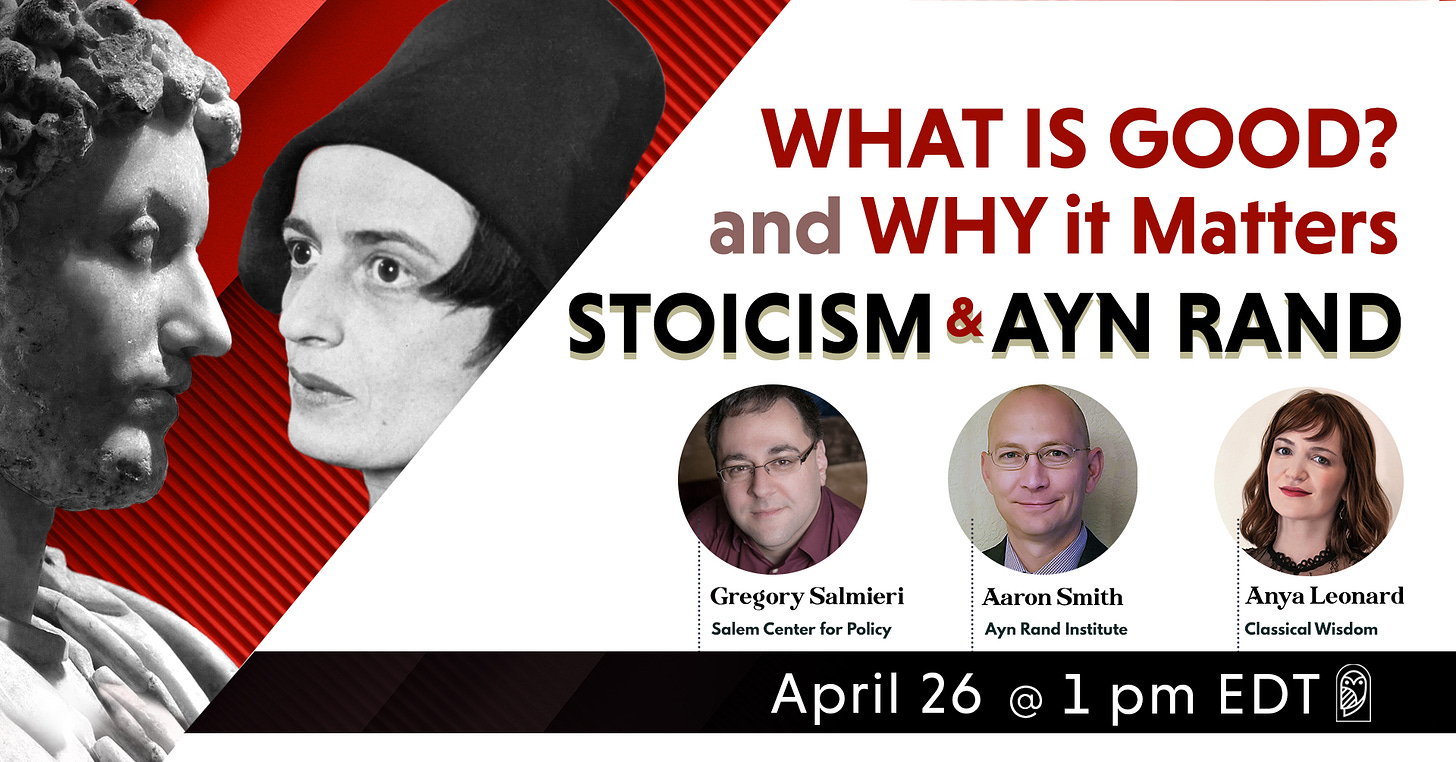Dear Classical Wisdom Reader,
Personally, I’m always a bit surprised by the reaction Ayn Rand causes. Folks either LOVE her or HATE her... with nary an ironically ‘objective’ position in between.
As a general rule, people don’t usually get so riled up by philosophers. Even Plato, Heidegger or Nietzsche, whose views having been employed for nefarious means throughout the ages (whether deserved or not), don’t inspire the same level of emotive responses...
Rarely does another thinker polarize a room so quickly, and yet the attacks or support of Rand often rely on her person, rather than her ideas, of which there are many. (Long-term readers know how I feel about ad-hominem as an argument: weak).
Indeed, it seems to me that Rand is often a ‘blindspot’ for so many... which prompts our question for this week...
How can we see our own blindspots? Is there a way to systematically identify and address them?
I was going to ask as well the purpose of doing so, but I think this should be self evident. After all, once we can realize our biases, we can better pursue honest dialogue. By removing our blindspots, we can see (hopefully) that which is true and that which is not.
To this end, I’d like to invite both fans of Rand and detractors alike to join Aaron Smith of the Ayn Rand Institute and Greg Salmieri of Salem Center for Policy at the McCombs School, as well as myself, on April 26th, 2023 for what will most certainly be a fascinating conversation.
We will discuss Stoicism’s versus Objectivism’s approach to valuing... and ask: What should we value? Why should we value it? And what is Good and Evil versus Indifferent?
Maybe you will change your mind, learn something new or simply encounter a view point you hadn’t previously considered... Either way, it promises to be a valuable event in and of itself. Make sure to register* here:
*As long as you register in advance, you can receive a recording, even if you aren’t able to attend on the day.
I hope you can join us!
In the meantime, please enjoy a quick smattering of reader mailbag responses... we’ll look at meat, culture, and the need (or not) of learning the original language.
All the best,
Anya Leonard
Founder and Director
Classical Wisdom and Classical Wisdom Kids
P.S. Fun fact: April 26th is actually the birthday of Marcus Aurelius... and I can’t think of a better way to celebrate the inspiring Roman emperor than to have a day of philosophically honest and curious conversation. So after joining us at 1pm EST to discuss some of the potentially problematic aspects of Stoicism, we’ll be looking at the positives at 3pm EST.
Please join Donald Robertson, founding member of Modern Stoicism, and John Sellars of Royal Holloway, University of London, for a fireside discussion on the life and philosophy of Marcus Aurelius, with particular focus on the relevance of his work for us today, coping with challenges of living in the modern world. You can register here.
Monday Mailbag:
On the Original Language:
As with your meat discussion, you might get a variety of responses on crossing cultural divides. For me, a meat eater with a vegan son and a vegetarian son and a meat-eating daughter, we have all decided that our diet is our diet and not up for discussion. We are all different. But one thing I do agree is that we humans today eat TOO MUCH meat and could all scale that back a bit.
As for crossing cultural divides, I do that all the time, and what awful people we would be if we couldn't! How narrow a structure we would live in if we didn't find these ways to ascertain the differences and similarities in people across borders and across time.
What I do specifically is work on a master database of all pre-contact copper artifacts found in the Americas as a way to try and track their huge trade network and civilization, much larger than anyone wants to give them credit for. But I don't know how to 'read' the artifacts. I can only guess. That's all archaeologists do.
Should they stop trying to understand that ancient past because they don't have a specific informed language? Should I stop being a historian because I don't understand the racist past? No, but I know it existed, and I know we have to understand each time period for what it was and how it operated. I'm working on a project where I'm trying to understand how all the different religions developed out of "many gods," including the many gods of reincarnation, so I am very thankful for those who allow me to access their interpretations of language I wouldn't have enough time in this lifetime to interpret.
Monette BR
WI
-
Hi Anya
Reading in the original language is best. Reading in translation is better...than not reading at all!
Which is why in my novel The Latin Student, the Latin passages from ancient authors included in the story are "translated" by the Latin Student - again, as part of the story - for those without a sufficient command of Latin.
Regards,
Denis
-
Hi Anya,
The questions that your correspondent and the issues which they pose are manifold.
As a new reader of CW, I doubt that going down the rabbit holes thereof is necessarily as fruitful as just doing what you were intending to do and, after reporting your credentials and sources, leaving an evaluation of the utility and provenance and how they add or subtract value from the exercise to the reader. Purists are inherently schismatic in nature and you cannot reliably cater to them if outwith their number. Besides, academic rigor may be more suited to a narrower audience than you might wish. No disrespect to a less formal and more relaxed approach is intended here. That’s what I enjoy after all and why I’m a reader.
With kind regards,
John
Yes, anyone can wade into the classics without speaking Greek. The Bible has been translated hundreds of times and still serves its intended purpose. The idea that you have to know the originating language stems from Catholicism who prevented the transmission of God’s Word by requiring it to be read and written in Latin. Here we have a modern day equivalent red herring straw man argument raised.
Experts and translations do suffer because each language may be a snowflake but no two snowflakes are identical and the differences and shadings do lead to problems. This must be noted but not used as an excuse for restricting study to the language of origin.
As to command of ancient words, how do you have command if you are not of that people and your native tongue is the same? The answer is there will be some filtering and at times maybe even a loss of Geist. To compensate, intent scholarship becomes the order of the day.
Charles F.
-
The joys, sorrows, and humdrum of our human existence do not change with time, location, environment, and weather. However, the words and grammatical structures we use in English and the scientific, romance languages do change with more words and different meanings/usage. All other minimally industrialized societies' languages of our planet still maintain their original structures and very few words.
Thus, the best translation should come from the descendants of those that are familiar with what was the intentions and message of the author. The most accurate and soulful way to interpret the meaning of any text is to live and work within the environment of its origin: physically breathe the air, taste its water, food, drinks, experience the smells, the Sun, the Moon, the colors, and live with their descendants within their physical environment and structures. When you communicate, and speak with anyone outside of Western industrial culture, you do not need all the words that we use. You look into each other's eyes, the windows of our souls, you experience each other’s smell, gaze, appearance, attitude, feel your environment and speak the very few words that are necessary.
In Thailand, for instance, if you want to know if someone speaks Thai, you can use the long formal sentence from a language class, or just naturally speak as a Thai: “Phud Thai/Speak Thai?”
We humans are taught that we are not like the animals that we are. And like all animals, our vision, smell, hearing, taste, body odor/posture, environment, weather, and interpretation of the occasion stimulates and frames our existence at that moment of wonderful commonality.
Peter DK






If you’re talking about Objectivism, then I don’t see it as a “blind spot” personally. It’s certainly an eyesore. I’m intrigued and hope to catch the recording post event.
Was mildly interested to see who was on the Ayn Rand side and found this “gem” from Aaron Smith who is on the panel. https://newideal.aynrand.org/the-false-promise-of-stoicism/
Not surprised to see him continuing the Randian practice of straw men. I find it funny that the majority of his article calls stoicism deterministic to an extreme degree such that we have categorically no control over our lives (never mind that stoicism is filled with literal practices that you would indeed have to choose to carry out) but also quotes the Serenity Prayer as though it’s meaningless. This really brings up what is so nauseating about Rand and her followers, the emphasis on “reality” while completely ignoring it. It’s hard to take these folks seriously enough to get past a “blind spot”, especially since “objectivism” is supposed to cut through perception and arrive at the objective truth. And yet they can’t objectively take the philosophy at face value when they say they are not determinists.